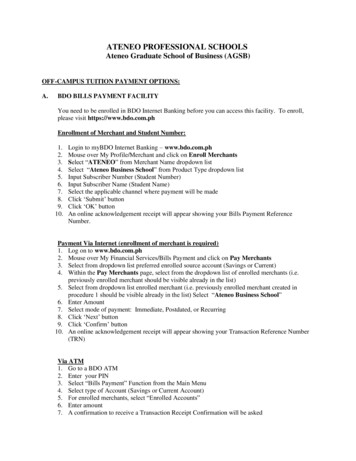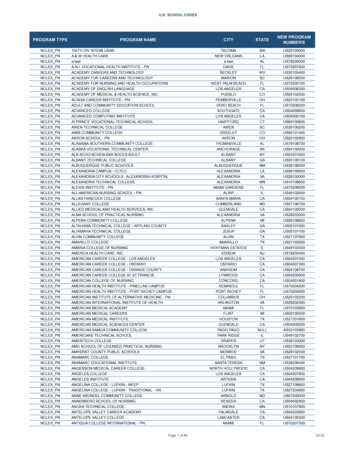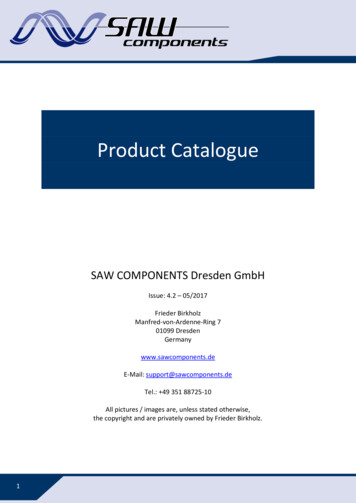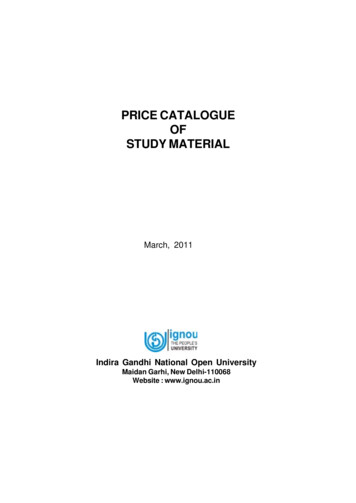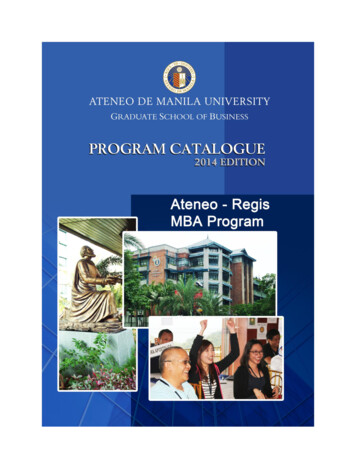
Transcription
PROGRAMCATALOGUEATENEO GRADUATE SCHOOL OF BUSINESSATENEO-REGIS MBA PROGRAM2014 EDITION
Copyright 2014 Graduate School of Business, Ateneo de Manila UniversityThe Ateneo-Regis MBA Program Catalogue is published byOffice of the RegistrarAteneo de Manila UniversityGraduate School of BusinessTelephone:Direct Line/Telefax:Address:E-mail:Website:899-7691, local 2214 to 2217899-554820 Rockwell Drive, Rockwell Center, Makati Cityregistrar.gsb@ateneo.eduwww.gsb.ateneo.edu
ContentsPART 1: G e n e r a l I n f o r m a t i o nI.A Brief History .1Ateneo De Manila University . 1Ateneo Graduate School Of Business . 2II.Vision and Mission .4The Ateneo de Manila University . 4Ateneo Graduate School of Business . 5III. Our Students and Graduates .6IV. Our Competence .7Faculty. . 7Programs and Course Offerings. . 7Teaching Methods and Resources. . 7Workplace-based & Experience-driven Pedagogy. . 7Technology-driven. . 7PART 2: T h e A t e n e o - R e g i s M B A P r o g r a mI.Distinctive Features .81. Partnership between Ateneo de Manila University and REGIS University . 82. Student-Centered Learning . 83. Faculty Assessment Process. 84. “Accelerated” Aspect.8II.The Ateneo-Regis MBA Program Curriculum .9General Description . 9Program Delivery: Facilitation and Student Participation . 10The Ateneo-Regis MBA Program Course Sequence . 12Course Descriptions . 13PART 3: A d m i s s i o n R e q u i r e m e n t sI.Requirements .25
General InformationPART IA BRIEF HISTORYAteneo De Manila UniversityThe Ateneo de Manila University traces its roots back to 1859 when, at the request of theCity of Manila endorsed by Governor Norzagaray, the Jesuits took over the Escuela Municipal inIntramuros, the walled city of Manila. A primary school originally intended for the sons ofSpaniards, it was opened by the Jesuits to native Filipinos as well. In 1865, the Jesuits receivedgovernment approval to add a five-year program leading to the degree of Bachelor of Arts. Inkeeping with its new academic status, the school was renamed the Ateneo Municipal de Manila.Among the graduates in those early decades was Jose Protacio Rizal, A.B. 1877, who would laterbe named the Philippines’ national hero.With the withdrawal of city subsidy in 1901, the Ateneo became a private institution,dropping the word “Municipal” from its official name. In 1921, the American Jesuits of theMaryland-New York Province replaced the Spanish Jesuits as teachers and administrators of theAteneo.The Intramuros fire of 1932 completely destroyed the Ateneo buildings, forcing the schoolto move to a new location on Padre Faura Street, Ermita. During the battle for the liberation ofManila, the Padre Faura complex of buildings was razed. Temporary structures were quickly built,but in 1952, the Ateneo moved to its present spacious campus in Loyola Heights, Quezon City.In 1958, the Society of Jesus in the Philippines was raised to the status of a full province.Administration of the Ateneo passed from the New York to the Philippine Province of the Societyof Jesus, and shortly after, the first Filipino Rector/President of the Ateneo was named. Since thegrowth of the Ateneo demanded a new status, the school obtained its charter as a university in1959.Today the Ateneo de Manila is a 155-year old institution comprised of basic, higher, andprofessional education units. The units of higher education—the School of Humanities, the JohnGokongwei School of Management, the School of Science and Engineering, and the School ofSocial Sciences—are collectively known as the Loyola Schools. The Graduate School of Business,the Law School, the School of Government, and the School of Medicine and Public Healthcomprise the Professional Schools. Like most Philippine universities, the Ateneo has a gradeschool and high school noted for high educational standards.1 o f 25
General InformationPART IThe Loyola Schools, basic education units, and the School of Government are located inthe Loyola Heights campus in Quezon City. The Graduate School of Business and Law School arebased in the Rockwell Center campus in Makati City. Finally, the School of Medicine and PublicHealth is based in Pasig City.The Ateneo’s identity is as a Filipino, Catholic, and Jesuit university known for producingprofessionals- for-others who excel in their fields and aim to serve the community through theirwork. It has recently identified four strategic thrusts for the coming years: mission and identity,nation-building, sustainable development, and internationalization. The Ateneo, as an academiccommunity, seeks to fulfill its mission through the exercise of the functions proper to a university,namely, teaching, research, and service to the community.Ateneo Graduate School of BusinessThe Graduate School of the Ateneo de Manila was first established in 1948, with Masterof Arts programs in Education and English as its initial offerings. Over time, other fields of studywere introduced, among them Sociology, Economics, Philosophy, and Business Administration.As its offerings grew in size and complexity, the Graduate School eventually found itnecessary to split into two separate entities, and in 1960 the Graduate School of Arts andSciences, and the Graduate School of Economics and Business Administration were born.The Graduate School of Economics and Business Administration initially offered only twopart-time evening programs: a Master of Arts in Economics, and a Master in BusinessAdministration. A full-time MBA was added to its program portfolio in 1964. Two years later,the Master of Arts in Economics was transferred to the Graduate School of Arts and Sciences,and the school was reorganized into the present-day Ateneo Graduate School of Business, orAGSB.In 1968, the Ateneo de Manila University, De La Salle College, the Ford Foundation, andHarvard University collaborated to set up the Asian Institute of Management (AIM), with theagreement that AIM was to concentrate on offering full-time MBA programs, while Ateneo andLa Salle would focus exclusively on part-time programs. As a result of this collaboration, AGSBseconded many of its faculty to the AIM, and discontinued its full-time MBA program. Nowfocused exclusively on working students, and wishing to move closer to its target clientele, AGSBmoved to a new campus on H.V. de la Costa St., Salcedo Village, Makati, in 1977.2 o f 25
General InformationPART IThe 1990s were a period of rapid growth and revitalization for AGSB under the leadershipof its new Dean, former Secretary of Health, Dr. Alfredo R.A. Bengzon, who took its helm in 1993.The period was characterized by the introduction of many innovative new degree as well as nondegree programs, and a boom in student enrollment.Under his leadership, the AGSB continued its special focus on health care managementand public health. The Master in Hospital Administration, launched in 1978, was reinvented asthe Master in Health Service Administration in 1998, and eventually, in 2002, renamed the MBAin Health. Many new non-degree programs were launched, including the award-winning Leadersfor Health program.In 1998, the Ateneo Professional Schools, made up of AGSB and the Ateneo Law School,moved to its new state-of-the-art campus at the Rockwell Center, in Makati City. The AteneoRegis MBA program was launched that same year, in partnership with Regis University (Denver,Colorado), a pioneer and leader in adult and workplace-based learning.In 2003, the Commission on Higher Education granted AGSB full autonomy status, inrecognition of its pace-setting innovations in management training and leadership development,and its continuous commitment to quality education. In 2004, CHED rated AGSB as the numberone business school in the country out of the 199 schools it evaluated that year. In August, 2010,the school received full accreditation from the Philippine Accrediting Association of Schools,College and Universities, or PAASCU.To make its brand of business education more accessible to a wider public, the AGSBoperates satellite campuses all over the country, including in Santa Rosa, Laguna; Clark Field,Pampanga; Cebu City, and Iloilo City.Staying true to the Jesuit tradition of magis and excellence in service to others, andconstantly spurred by its passionate desire to provide its students with the best quality educationin the service of the nation, the AGSB today remains ever more committed to its valueproposition that business is not only for profit but also for nation building, and that “our countryis our business”.3 o f 25
General InformationPART IVision and MissionTHE ATENEO DE MANILA UNIVERSITYAs a University, the Ateneo de Manila seeks to preserve, extend, and communicate truthand apply it to human development and the preservation of the environment.As a Filipino University, the Ateneo de Manila seeks to identify and enrich Philippineculture and make it its own. Through the education of the whole person and the formation ofneeded professionals and through various corporate activities, the University aims to contributeto the development goals of the nation.As a Catholic University, the Ateneo de Manila seeks to form persons who, following theteachings and example of Christ, will devote their lives to the service of others and, through thepromotion of justice, serve especially those who are most in need of help, the poor and thepowerless. Loyal to the teachings of the Catholic Church, the University seeks to serve the Faithand to interpret its teachings to modern Philippine society.As a Jesuit University, the Ateneo de Manila seeks the goals of Jesuit liberal educationthrough the harmonious development of moral and intellectual virtues. Imbued with the Ignatianspirit, the University aims to lead its students to see God in all things and to strive for the greaterglory of God and the greater service of mankind.The University seeks all these, as an academic community, through the exercise of thefunctions proper to a university, that is, through teaching, research, and service to thecommunity.4 o f 25
General InformationPART IATENEO GRADUATE SCHOOL OF BUSINESSVisionTo be a leading management educational institution in the Asia-Pacific region for thebusiness practitioner seeking to become a professional and ethical business leader committed tonation building.MissionAs a Jesuit institution whose identity and purpose is derived from a tradition of serviceand a standard of academic excellence, we are committed to: Developing and nurturing leaders and managers who are guided by principles, imbuedwith a sense of service, and equipped with effective management skills. We believethat expertise without integrity is empty and integrity without expertise is ineffectual,while expertise and integrity without service is irrelevant. Educating and forming leaders and managers using facilitative learningmethodologies that integrate technical, technological, political, and ethicaldimensions, in both theory and practice. We believe that intellectual rigor andstrength of character form the essential foundation for business professionals. Enhancing the personal and professional growth of our faculty and staff. We believethat success in fulfilling our mission is decided by the dedication of the members ofour organization. Drawing on the expertise of our faculty, the different units of the University, as wellas strategic partners to address the challenges of technology, competition and beingup-to-date in domestic and global settings. We believe that in harnessing theresources of our various stakeholders in an interactive and integrated manner weremain effective and relevant in the changing times.As we pursue these commitments, we will strive to bridge the external and internal gapsin our communities and in our country so that our people may achieve a just and good life.5 o f 25
General InformationPART IOur Students and GraduatesOur students are workplace-based, practitioner adult learners who are well on their wayto managerial careers and wish to take advanced studies to equip them with the concepts,theoretical models, skills, principles, and values needed by today’s managers and leaders. Weseek to produce professionals, who can manage and lead in a changing environment, withfundamental skills steeped in unwavering principles and values. We strive to produce graduateswho can: Critically analyze information, situations, systems and issues. Make strategic and innovative decisions in an unpredictable environment and in a globalcontext. Integrate concepts from various disciplines and arrive at a synthesis and/or newknowledge applying these to business situations and other realities. Integrate the use of information and cost-efficient technologies. Manage stakeholder relationships and issues. Demonstrate high proficiency in written and oral communication in a business context. Utilize effective teams in performing tasks and managing activities. Demonstrate effective personal and organizational leadership skills. Make business decisions according to solid, appropriate and defensible moral principlesand address business ethical questions and dilemmas with reason and integrity. Promote social responsibility and work towards making a contribution to nation -building.Thus, a graduate of the Ateneo Graduate School of Business, is a product of an Ateneoeducation – technically competent, and socially committed.6 o f 25
General InformationPART IOUR COMPETENCEFaculty. Our faculty members are workplace-based and experience-driven managementpractitioners occupying senior executive positions in their respective organizations orentrepreneurs managing their own businesses.Programs and Course Offerings. The AGSB addresses the need for the management andbusiness education of individuals and institutional clients, from both the private and publicsectors. The AGSB assesses and defines the training needs and designs the most appropriateprograms and course offerings to meet these needs. The customizing of courses provides thestrength and relevance of the programs and offerings of the AGSB.Teaching Methods and Resources. The teaching methods employed in the courses,seminars, and workshops are imbued with the following elements. Bias for research and critical thinking Human resource focus and orientation Information technology-drivenAGSB invests in teaching and learning resources, such as computers and internet services,state-of-the-art audiovisual equipment, up-to-date teaching materials, both local and foreigncase materials, and particularly cases prepared and submitted by our faculty.The AGSB uses the adult learner methodology of facilitative learning wherein bothstudents and faculty are simultaneously teachers and students who leverage their practicalexperiences in an interactive manner. Through this methodology, the theories and conceptslearned are immediately applied, validated, improved, and enhanced in a real business setting,and complementarily, practical insights and knowledge of practitioners are brought into theclassroom for enhanced learning.Workplace-based & Experience-driven Pedagogy. Theory and practice come togethernaturally at the AGSB. Theories and principles are enlivened by being situated in the concretemanagement experiences of the teachers. At the same time, the work experience of the studentsare better understood and made more meaningful when contextualized within managementtheories and principles.Technology-driven. Today’s society is an information-driven society. The AGSBemphasizes information as an asset and the technology that is made available to access, process,and utilize this information.7 o f 25
PART IIThe Ateneo-Regis MBA ProgramDISTINCTIVE FEATURES1. Partnership between Ateneo de Manila University and Regis UniversityAteneo de Manila University and Regis University, a recognized Center for AdultLearning in Denver, Colorado, in the United States, entered into a Program Developmentand License Agreement in October 1997. Under the agreement, the two Jesuitinstitutions, through the Ateneo Graduate School of Business and Regis University’sInternational Studies Program and its Graduate School of Business, committed to developan MBA program designed specifically for adult learners.2. Student-Centered LearningThe program is student-centered rather than teacher-dependent. Although theteacher may still deliver lectures, his facilitation skills are essential to bring out theexperiences of his adult students. For this reason, individuals undergo a facultyassessment process to determine qualification to teach in the Regis program.3. Faculty Assessment ProcessThe assessment process includes a twenty-minute presentation on an assignedtopic in a facilitative mode, an interview, a leaderless group activity, an essay on valuecentered education, and a test on evaluating and grading student papers. The assessmentprocess and the training of facilitators were designed by Regis University.4. “Accelerated” AspectThe program is commonly referred to as “accelerated” because each course istaken in an eight (8) week term with four (4) hours each session rather than the usualfifteen (15) week term with three (3) hours each session.8 o f 25
PART IIThe Ateneo-Regis MBA ProgramTHE ATENEO-REGIS MBA PROGRAM CURRICULUMGENERAL DESCRIPTIONa. The Ateneo-Regis MBA Program is a non-thesis program designed for seniormanagers and executives whose corporate responsibilities limit their time forpursuing graduate degrees and are thus compelled to complete the program asquickly as possible through accelerated methods. The program is also designed forsenior practitioners whose learning styles and outcomes are achieved throughtheir own direct participation in learning activities without too much classroominterface.b. Each term of the Ateneo-Regis MBA Program lasts for eight (8) weeks. Each coursemeets once a week for
Regis MBA program was launched that same year, in partnership with Regis University (Denver, Colorado), a pioneer and leader in adult and workplace-based learning. In 2003, the Commission on Higher Education granted AGSB full autonomy status, in recognition of its pace-setting innov
